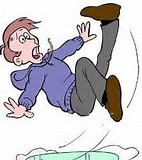by: Peter J. Gallagher (@pjsgallagher) (LinkedIn)
 I tagged this post in the "banking" category even though its only connection to banking is that it involves a slip-and-fall that occurred in a bank parking lot. But, it offers yet another example of something I have written about before — liability of property owners for accidents that occur on their property.
I tagged this post in the "banking" category even though its only connection to banking is that it involves a slip-and-fall that occurred in a bank parking lot. But, it offers yet another example of something I have written about before — liability of property owners for accidents that occur on their property.
In Negron v. Warriner's Construction Co., plaintiff slipped on ice and snow in a PNC Bank parking lot that he was using as a short cut to get from his home to a nearby Dollar Store. A morning snow storm dropped approximately 5-6 inches of snow on the area. After the snow stopped, the parking lot was plowed and salted. Plaintiff, who lives across the street from the bank, actually watched the lot get plowed and salted. Several hours after the lot was plowed, a light snowfall covered the lot again with a dusting of snow and, in certain spots, ice underneath.
At around 9 pm, after the second snowfall, plaintiff left his home for the Dollar Store. "Rather than staying on public sidewalks, plaintiff took his normal route by taking a shortcut across the PNC Bank parking lot." This was apparently not uncommon in the neighborhood; residents regularly cut across the lot. There were no fences or gates preventing them from doing so, but there was a "No Trespassing" sign. There was also a sign restricting parking to only bank customers, but this was frequently ignored by neighborhood residents who parked their cars in the lot.
Plaintiff's walk to the Dollar Store on that snowy night was uneventful. His walk back was not. He admitted that he walked with caution in both directions because of the presence of snow and ice. But, he claimed that he did not notice ice in the area where he slipped and fell until it was too late. He also acknowledged that he did not "have any traction issues on his return trip home until he fell." In fact, plaintiff admitted to walking the same path through the parking lot there and back and was therefore not looking for ice because, as he testified: "Well, I knew I was walking on snow, you know. Other than that I wasn't like – because to me I walked there. I didn't think nothing of it coming back."
After his fall, plaintiff sued the owner of the lot and its snow and ice removal company. Defendants moved for summary judgment, arguing that plaintiff was a trespasser and, therefore was only entitled to be warned of artificial conditions on the property that posed a risk of death or serious bodily harm. Plaintiff countered that the bank knew, or should have known, that residents used the lot as a shortcut and therefore it owed pedestrians a duty to ensure their safety. The court granted defendants' motion and dismissed the complaint.
The court began its opinion by reciting the well-settled obligations of different types of property owners to different types of individuals. Commercial landowners owe a duty to exercise reasonable care in maintaining their property. But the scope of this duty changes depending on the person to whom it is owed. A landowner's duty to a trespasser is "slight" and requires only notice of artificial conditions that pose a risk of death or serious bodily harm. By contrast, a landowner owes a "social guest or licensee" a slightly greater duty. The landowner does not have to discover latent defects but must warn a social guest or licensee of any known dangerous conditions. Finally a landowner owes "business invitees or guests" the highest duty. For them, the landowner must take reasonable care to guard against any dangerous condition the landowner knows about or should know about, and this duty includes an affirmative obligation to conduct a reasonable inspection of the property to discovery latent defects.
In Negron, plaintiff was a trespasser. He did not use the bank or the ATM. Instead, he was using the lot as a shortcut. As a result, the bank only had a duty to warn him of artificial conditions that posed a risk of death or serious bodily harm. Snow and ice are not artificial conditions, therefore the bank had no duty to warn plaintiff about them.
Even if this were not the case, and the bank was under some duty to plow the snow, the "timeline" did bot give the bank the time to do so. As the court held: "Put simply, defendants had no reasonable opportunity to address the additional snowfall or its impact on any existing ice. To hold defendants liable, plaintiff would seemingly impose a duty on defendants to post a weather sentry around the clock to immediately address inclement weather conditions, even when the bank is closed. The law imposes no such duty."
Finally, it is worth considering whether the court's holding would have been different if plaintiff stopped to use the ATM at the bank on his way to or from the store. Would that have made him a business invitee and thus entitled to be warned of dangerous conditions? If so, would that have included a warning about snow and ice? Also, if he used the ATM on the way to the Dollar Store, which would have made sense, would he have been an invitee on the way their but a trespasser on the way back? Not sure, but that would likely have been a much tougher question for the court. This is the stuff of a torts final exam.